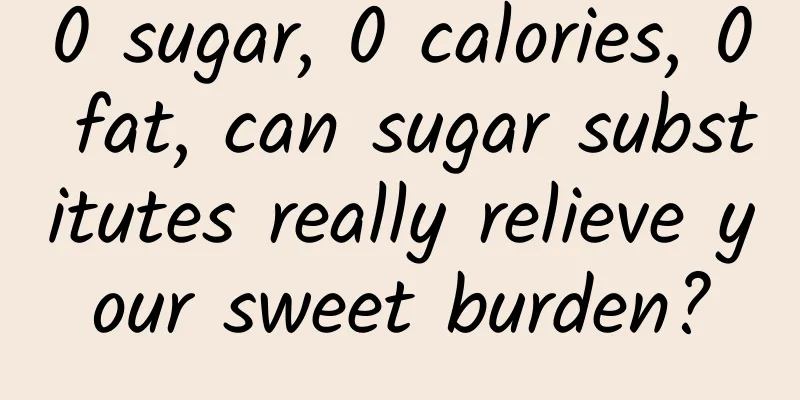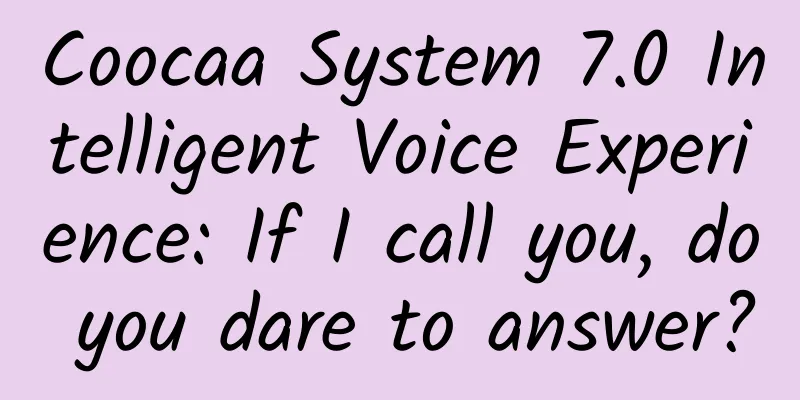0 sugar, 0 calories, 0 fat, can sugar substitutes really relieve your sweet burden?

|
Audit expert: Wu Xi Deputy Chief Physician, Department of Endocrinology, Huashan Hospital, Fudan University, Doctor of Medicine Once upon a time, we enjoyed the happy water of fat otakus while worrying about the fat on our stomachs "bursting out" like bubbles in the bottle. However, the emergence of sugar-free cola seems to have made this entanglement a thing of the past. Source | Internet Major milk tea shops have also introduced "zero-calorie sugar" options, so you can finally drink milk tea happily~ Netizens joked that "sugar substitutes are simply one of the greatest inventions of the 21st century ." Its appearance seems to be a universal key to solving the problems of "craving for food" and "gaining weight." Who can refuse something that has no calorie burden and can simply and directly provide happiness? However, is there really such a good thing in the world that is "all beneficial and no harmful"? Source: A shopping website Do sugar substitutes cause obesity? The debate on whether sugar substitutes are harmful to health and whether sugar substitutes can cause obesity has not been settled since the first generation of artificial sweeteners came out to the day when erythritol became popular all over the Internet. On August 19, an article published in the authoritative magazine Cell titled "Non-nutritive sweeteners affect human glucose tolerance through specific bacterial flora changes" brought this topic into the public eye again. Source: Screenshot of the paper in Cell magazine The study selected 120 healthy adults for the experiment to evaluate the effects of non-nutritive sweeteners (NNS) on human indicators and their microbiota. The test contains 4 important information points: 1. This is a randomized controlled clinical trial on the effects of NNS on the human body. 2. Sucralose and saccharin may impair glycemic response in healthy adults. 3. There are individual differences in the effects of NNS on human microorganisms and metabolism. 4. The effect of NNS on microorganisms in the human body is causally related to the increased blood sugar response. In the past, it was believed that sweeteners such as saccharin, sucralose, aspartame, and stevia do not contain calories and do not cause postprandial blood sugar responses. However, this experiment proves that the intake of NNS may cause microbiome-dependent blood sugar changes in certain populations, and is not "all good without any harm." Will there be no effects on the body if the prescribed dose is taken? You might be smart and say: It is foolish to talk about harm without considering the dosage! So, can we rest assured if we take it within the prescribed dosage? No. This experiment included four NNS intervention groups, namely aspartame , saccharin , sucralose and stevia, which were co-ingested with a small amount of glucose as a carrier. The doses were all within the normal range, equivalent to 8%, 20%, 34% and 75% of the acceptable daily intake (ADI), respectively; the two control groups of the experiment were a control group with an equal amount of glucose (to control potential confounding effects) and a blank control group that did not receive any intervention. The study was divided into three phases: ① Baseline measurements of human metabolism and microbial data were performed in the first 7 days; ② Corresponding intervention measures were given for 14 days; ③ After that, supplementation was stopped and participants were followed up for another 7 days. The results showed that compared with the glucose carrier control group and the blank control group, both saccharin and sucralose significantly increased the blood sugar response during the intervention period, indicating that short-term intake of sucralose and saccharin below the ADI dose can affect the glucose tolerance of healthy individuals. Source: Screenshot of the paper in Cell magazine Further analysis of the subjects' fecal samples showed that adding NNS to the diet can affect the human intestinal microbiota, among which sucralose and saccharin groups had a significant effect on the composition of the microbiota. Similarly, NNS also significantly affects the oral microbiota. To determine whether changes in the structure of the oral and intestinal microbiota are the root cause of the increased blood sugar response caused by NNS, the researchers transplanted the fecal flora of participants in each group (each group contained 4 participants with the largest blood sugar response and 3 participants with the smallest blood sugar response) into germ-free mice. For the top responder transplant samples, the four NNS groups of saccharin, sucralose, aspartame and stevia all showed higher blood sugar responses; while for the bottom responder transplant samples, the saccharin group still increased the blood sugar response of the recipient mice, while no significant changes in blood sugar were observed in the remaining intervention groups. The experimental results show that there are individual differences in the effects of NNS on intestinal flora and glucose tolerance, but regardless of the high or low response, saccharin will cause the subjects' blood sugar response to increase, and further illustrate the causal relationship between NNS regulation of the human microbiome and glucose tolerance impairment. Source: Screenshot of the paper in Cell magazine In summary, NNS may not be as physiologically inert as previously thought, and may still affect individual health even if the intake dose is lower than the ADI. The underlying mechanism is likely related to changes in the human microbiome. What are the common sugar substitutes? Seeing this, you may have another question: What are the sugar substitutes? And which one can be eaten safely? There are several different ways to classify sugar substitutes. If we classify them by the "calorie" that everyone is most concerned about, they can be divided into "nutritional sweeteners" that provide a certain amount of energy and "non-nutritive sweeteners" that contain almost no calories. Source: "Analysis of the Game between Sugar and Sugar Substitutes and Development Trends" The most common nutritive sweeteners are various sugar alcohols: xylitol , which is widely used in chewing gum and in the diet of diabetic patients due to its anti-caries properties and non-insulin regulation ; maltitol, which is widely used in ice cream and bread due to its emulsification stability and good moisturizing properties; sorbitol , which is used as a wetting agent, stabilizer and chelating agent in cakes, candies and canned products; and erythritol, the "hottest new star" in the sugar substitute world, which is commonly added to various zero-calorie beverages and zero-sugar desserts. Source: Internet Sugar alcohol sweeteners are generally less sweet than sucrose, with a pure sweetness close to real sugars; they are also often low in calories and are less likely to cause blood sugar fluctuations. However, it should be noted that excessive intake of sugar alcohols may cause adverse reactions such as diarrhea and digestive disorders, so they should still be consumed in moderation. Non-nutritive sweeteners without caloric burden can be divided into natural sweeteners and synthetic sweeteners according to their sources. Natural sweeteners are mostly extracted from plants, including stevioside, glycyrrhizin, mogroside , etc. They are not absorbed and do not produce heat energy after consumption, and are ideal sugar substitutes for patients with diabetes and obesity; their sweetness is often hundreds of times that of sucrose, so they are often compounded with low-sweetness sugar alcohols to obtain good flavor while effectively reducing product prices. In addition, the source of mogroside, monk fruit, is a medicinal material that is both a medicine and a food, and has the effects of clearing heat and relieving cough, moisturizing the intestines and promoting bowel movements. Studies have shown that monk fruit is very beneficial for improving human immunity and preventing metabolic diseases such as hyperlipidemia and diabetes. The emergence of Coke Zero has brought artificial sweeteners into the public eye. Commonly used synthetic sweeteners include cyclamate, acesulfame potassium, sucralose, aspartame , etc. Source: Internet When it comes to "artificial synthesis and industrial production", people often wear tinted glasses and worry that their safety is not as good as natural sweeteners. In fact, artificial sweeteners have a longer research and development and application history than natural sweeteners, and there are often strict regulations on their scope of use, so their safety is guaranteed. Nowadays, various artificial sweeteners are widely used in various fields such as beverages, canned foods, and baked products. Source: "Analysis of the Game between Sugar and Sugar Substitutes and Development Trends" Finally, although sugar substitutes are good, don’t eat too much! |
<<: Don’t take good photos? Try to “think” from the perspective of the camera…
>>: Carp: The oldest farmed fish in the world
Recommend
24-hour emergency response丨This round of epidemic has entered the final stage. The death toll from traffic accidents in Ma'anshan, Anhui has increased to 10
Hot News TOP NEWS The current round of epidemic i...
GAC Aion LX80 review: In the era of software-defined cars, how do electric motors crush internal combustion engines?
Domestic electric vehicles were once widely quest...
The "most secure" iOS was also conquered, a new iPhone vulnerability was exposed, and Apple admitted that it could not be fixed
Although Apple's technology is powerful, iOS ...
The best daily ratio of sitting, standing, sleeping and moving time is revealed! Follow this to stay healthier
Everyone knows the principles of "combining ...
iPhone 12 real machine exposed! Design pays tribute to iPhone 4, battery is greatly reduced, price may be the biggest surprise
Apple can’t afford to lose with the iPhone 12 ser...
APICloud builds an ecosystem to accelerate mobile development
APICloud 2015 product launch conference was succe...
Get 10,000+ users in 7 days, with a conversion rate of over 50%. You only need to do 3 things to achieve group fission
% ignore_pre_1 % When talking about traffic now, t...
Key points and analysis of public relations and marketing plan!
"Marketing planning" is a relatively va...
After promoting tens of millions of information flows, I have summarized these 6 points!
In today's mobile Internet era, we receive a ...
Who will win the battle of smart TVs?
Since the emergence of Internet TV in 2006, smart...
The dumb way to promote App online, the qualitative change from 0 to 1 million users
There are some stupid ways to promote apps online...
Private domain traffic: How to build a WeChat private domain closed loop?
“In 2019, the national population reached 1.4 bil...
A comprehensive guide to the event planning process!
Although event planning is very important, when w...
Apple AI is online, ChatGPT is free to use! The first M4 Mac is born, Cook: This is the best AI all-in-one machine in the world
Just now, Apple AI officially landed on iPhone, i...
VIVO App Store Application Submission Process
Application Submission Process 1. Create an appli...









